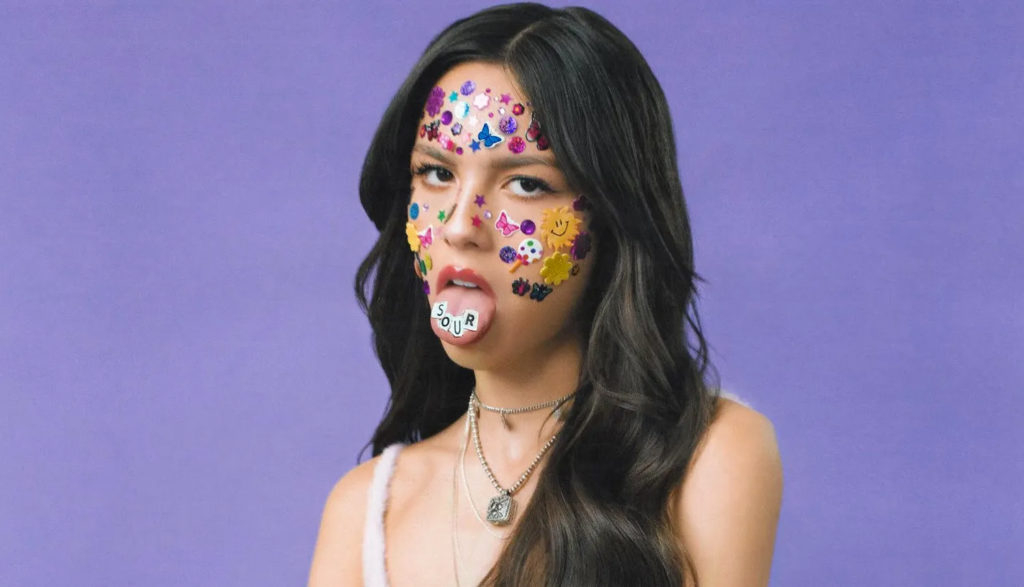
On January 8, 2021, teen actress and singer/songwriter Olivia Rodrigo released her song “drivers license.” To put it simply, the whole world exploded.
The Disney star’s debut single shot to No. 1 on multiple charts, including the Billboard Hot 100. It quickly broke several Spotify streaming records. By the end of its first week of release, the single had garnered 80 million streams. Needless to say, the world was clamoring for more Olivia Rodrigo—and she has delivered with her debut album SOUR.
SOUR mostly deals with the aftermath of Olivia’s very public breakup with her High School Musical: The Musical: The Series costar Joshua Bassett, and how quickly he moved on to fellow actress/singer Sabrina Carpenter. Throughout the 11 songs on the album, the 18-year-old singer and actress explores a multitude of reactions to her first major breakup, from feeling betrayed (on the track “traitor”), brokenhearted (“drivers license”), smug (“déjà vu”), spiteful (“good 4 u”) and more. She also touches on her insecurity, anxiety, and the strong influence of social media on her fellow members of Generation Z.
Don’t be fooled by the singer’s youth, however. Olivia is determined to signal her entry into adulthood through profanity and mature lyrics.
Olivia makes it very clear throughout the album how strong her feelings for her ex-boyfriend were, even if he didn’t feel the same. On “traitor,” she sings, “Loved you at your worst, but that didn’t matter.” On “drivers license,” we hear this vulnerable lyric: “And I know we weren’t perfect/But I’ve never felt this way for no one.”
With the benefit of hindsight, Olivia recognizes the flaws in her relationship. On “favorite crime,” for instance, she acknowledges the role she played in its downfall (“Know that I love you so bad/I let you treat me like that/I was your willing accomplice honey”). She also sees that her boyfriend did not treat her like he should have, but she’s able to wish him well on “happier” (“I hope you’re happy/I wish you all the best, really”).
On “jealousy, jealousy,” Olivia highlights a problem faced by many people her age: an obsession with social media that leads to comparison and insecurity. She sings that even though she knows that her value is not dependent on others, it’s hard not to compare herself to them (“I know their beauty’s not my lack/But it feels like that weight is on my back”).
“hope ur ok” finds Olivia reflecting on her childhood friendships and hoping that they’re doing better now than they were in their youth (“I hope that you’re happier today/’cause I love you/And I hope that you’re okay”).
Of the 11 tracks on SOUR, eight of them deal to some extent with Olivia’s breakup. And many of them describe a relationship that is far from healthy. On “1 step forward, 3 steps back,” she claims that her boyfriend’s inconsistency and aggression made her extremely insecure (“Called you on the phone today/Just to ask you how you were/All I did was speak normally/Somehow I still struck a nerve”). On “traitor,” she calls out her ex for moving on so quickly, wondering if he ever cared about her at all (“And I know if you were true/There’s no d–n way that you/Could fall in love with somebody that quickly”).
Olivia also frequently sings about her insecurity, partly caused by her ex and how he treated her, and partly due to social media. The album is filled with self-deprecating lyrics, such as these on the song “brutal”: “I feel like no one wants me/And I hate the way I’m perceived/ … And I’m not cool, and I’m not smart.” She continues this theme on “jealousy, jealousy” (“And I’m so sick of myself/Rather be, rather be/Anyone, anyone else”).
On “hope ur ok,” where Olivia describes some of her childhood friends, she implies that they were shunned by their families for feeling same-sex attraction. She even goes so far as to claim one of her friend’s parents were not supportive because of their religious beliefs (“His parents cared more about the Bible/Than being good to their own child”). She goes on to imply that the same friend engaged in self-harm (“He wore long sleeves ’cause of his dad”).
Olivia goes through multiple stages of heartbreak on her album, some of them less healthy than others. On “good 4 u,” she lashes out at her ex with resentment and spite (“Remember when you swore to God I was the only/Person who ever got you? Well, screw that, and screw you”). In the same song, she even calls him a “sociopath.” On “déjà vu,” she smugly reminds her ex that everything he does with his new girlfriend, he did with her first (“So when you gonna tell her that we did that, too?/She thinks it’s special, but it’s all reused”).
Profanity is frequent in Olivia’s lyrics; the f-word is used five times across the album, on “brutal,” “driver’s license,” “1 step forward, 3 steps back,” and “good 4 u.” The s-word is used on “déjà vu” and “happier,” while other expletives such as “h—” and “d–n” also appear. God’s name is also misused about five times throughout the album.
A few suggestive references also appear. On “traitor,” Olivia tells her ex, “When she’s sleepin’ in the bed we made/Don’t you dare forget about the way/You betrayed me.” In the same song, she claims that her boyfriend was talking to another girl while they were together, but she also worries that they maybe “did even worse.” On “happier,” Olivia asks her ex to “think of me fondly when your hands are on her,” referring to his new girlfriend.
Every few years, an artist comes along that provides a voice for young people and their various struggles as they move into adolescence. Taylor Swift’s first few albums spoke to teenagers about love, innocence and heartbreak; Lorde sang about her fear of getting older and wasting her youth, and more recently, Billie Eilish’s attitude, wardrobe and music have made her a sensation. Now, Olivia Rodrigo takes on the role of her generation’s musical voice.
That’s both a good and a bad thing. It can be helpful for teenagers to know that they’re not alone, that even glamorous pop stars struggle with social media making them feel inadequate. Even celebrities with seemingly perfect relationships can be made to feel insecure by their partner.
While Olivia may lay out these problems, however, that’s where her positive influence ends. She doesn’t offer any solutions or any concrete hope. Teenagers should know that they’re not alone in feeling anxious or insecure, but they should also understand that they won’t solve these issues through “self-confidence” or with a romantic relationship. Understanding that true value lies in a relationship with Christ is the only way to begin solving insecurity—not that you’d get that from Olivia’s lyrics.
Yes, SOUR is effective in that it uses honest and vulnerable lyrics to provide a voice for teenagers and young adults through their struggles. It could also be used as a springboard for discussions about the dangers of social media and what constitutes a healthy relationship. But it doesn’t give those same teenagers anywhere to go with their issues or offer any solutions for them—and it doesn’t help that she uses foul language and incredibly self-derogatory lyrics to tell her story.


Lauren Cook is serving as a 2021 summer intern for the Parenting and Youth department at Focus on the Family. She is studying film and screenwriting at the University of North Carolina School of the Arts. You can get her talking for hours about anything from Star Wars to her family to how Inception was the best movie of the 2010s. But more than anything, she’s passionate about showing how every form of art in some way reflects the Gospel. Coffee is a close second.